1.6: Charlotte Smith (1749-1806)
- Page ID
- 102492
Charlotte Smith’s father, Nicholas Turner, was a wealthy gentleman who nevertheless lived beyond his means. Her mother, Anna Towers, died when Smith was four years old. Smith was then left to the care of her father and aunt. She received the education her society deemed sufficient for women. At a school in Chichester, she learned dancing, drawing, and music. She further educated herself through avid reading.
In 1765, her father married Henrietta Meriton, a wealthy woman whose temperament convinced the aunt to remove Smith from her father’s household. At the age of fourteen, Smith was married to Benjamin Smith, who came from a wealthy family with estates in the West Indies. They had twelve children, three of whom died early. Smith likened their marriage to legalized prostitution, a view that later women writers would repeat, protesting the limited opportunities for supporting themselves through work. The marriage was not a happy one.
Benjamin Smith squandered what money they had and did little, if anything, to acquire more. His father, Richard Smith, bought them a country estate which, through  Benjamin’s mismanagement, failed to accrue any income. Richard admired Smith’s intellect and sought to use her skills, especially in writing, to further his own business interests. His holdings included plantations that relied on slave labor, an institution Smith would later protest against in her writing. Richard Smith tried to provide for Smith in his will but legal problems prevented her inheriting any money until the year she died. Her husband was imprisoned for debt for seven months, during which time Smith joined him, and later emigrated with his family to Normandy to escape creditors. Eventually, Smith obtained legal separation. She retained custody of their children.
Benjamin’s mismanagement, failed to accrue any income. Richard admired Smith’s intellect and sought to use her skills, especially in writing, to further his own business interests. His holdings included plantations that relied on slave labor, an institution Smith would later protest against in her writing. Richard Smith tried to provide for Smith in his will but legal problems prevented her inheriting any money until the year she died. Her husband was imprisoned for debt for seven months, during which time Smith joined him, and later emigrated with his family to Normandy to escape creditors. Eventually, Smith obtained legal separation. She retained custody of their children.
While in debtor’s prison with her husband, Smith wrote Elegiac Sonnets, and Other Essays. She had it published at her own expense in 1784. Its success encouraged her to write as a means of financial support, which she did until a few years before she died. Her astonishing literary productivity—of fiction, poetry, and drama—attests to her financial need and her business acumen and knowledge of the literary marketplace. It also attests to her literary ambition. She felt driven by market demands to write fiction. Yet her long fiction displays increasing experimentation with the developing novel genre, with its hybridity, with its tension between actuality and concrete particulars and fantasy, with its place for self-representation that proved truer than fiction. Her long fiction actively engages with her era’s revolutionary politics, propounding liberal views, maintaining critical conversations with radical thinkers like Mary Wollstonecraft (1759-1797), and exposing the subject position of women. They often reflect personal concerns—with sexuality, vulnerability, poverty—that reflect upon social issues, particularly regarding women’s place in society and lack of legal rights.
Smith preferred writing poetry, then a more respected genre than fiction, and identified herself as a poet. Her use, indeed revival, of the sonnet form countered the eighteenth-century heroic couplet. She infused her sonnets with emotion and personal sensibility, particularly with her sincere affection for nature. They directly influenced Wordsworth and Coleridge, modeling for these writers a responsiveness to nature.
1.5.1: “To a Nightingale”
Poor melancholy bird—that all night long
Tell’st to the Moon thy tale of tender woe;
From what sad cause can such sweet sorrow flow,
And whence this mournful melody of song?
Thy poet’s musing fancy would translate
What mean the sounds that swell thy little breast,
When still at dewy eve thou leav’st thy nest,
Pale Sorrow’s victims wert thou once among,
Tho’ now releas’d in woodlands wild to rove?
Say—Hast thou felt from friends some cruel wrong,
Or diedst thou—martyr of disastrous love?
Ah, songstress sad! that such my lot might be,
To sigh and sing, at liberty—like thee!
1.5.2: “To Sleep”
Come balmy Sleep! tir’d Nature’s soft resort!
On these sad temples all thy poppies shed;
And bid gay dreams from Morpheus’ airy court,
Float in light vision round my aching head!
Secure of all thy blessings, partial Power!
On his hard bed the peasant throws him down;
And the poor sea boy, in the rudest hour,
Enjoys thee more than he who wears a crown.
Clasp’d in her faithful shepherd’s guardian arms,
Well may the village girl sweet slumbers prove;
And they, O gentle Sleep! still taste thy charms,
Who wake to labour, liberty and love.
But still thy opiate aid dost thou deny
To calm the anxious breast; to close the streaming eye.

